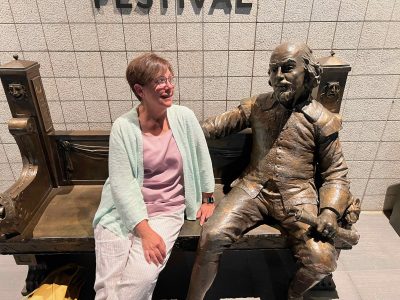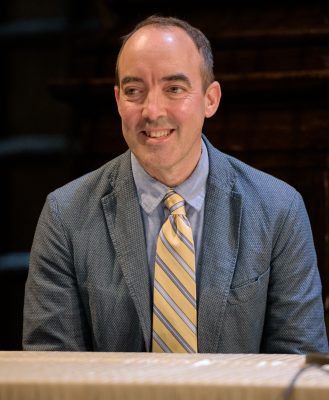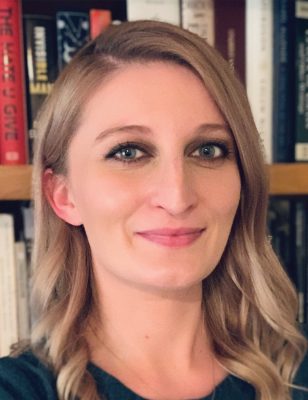
Evelyn Tribble is a Professor of English and the Associate Dean for Humanities and Undergraduate Affairs, at UConn. Her research interests center around Shakespeare, performance, memory, and skill. She explores theatrical history through the lens of Distributed Cognition, asking how Shakespeare’s company met the astonishing cognitive demands of their profession, particularly the performance of up to six different plays a week.
Tribble is the author of:
- Margins and Marginality: The Printed Page in Early Modern England (Virginia, 1993).
- Writing Material: Readings from Plato to the Digital Age (with Anne Trubek, Longmans, 2003).
- Cognitive Ecologies and the History of Remembering (with Nicholas Keene, Palgrave Macmillan, 2011).
- Cognition in the Globe: Attention and Memory in Shakespeare’s Theatre (Palgrave Macmillan, 2011).
- Early Modern Actors and Shakespeare’s Theatre: Thinking with the Body (Arden Bloomsbury, 2017).
- The Palgrave Handbook of Literature and Science (with Howard Marchitello, Palgrave, 2017).
She has also published articles in Shakespeare Quarterly, Shakespeare, Shakespeare Survey, Shakespeare Studies, and Textual Practice, and ELH, among others. Tribble’s current research projects include the Arden 4 edition of Merry Wives of Windsor, and a book on magic and performance in early modern England.
 Brendan Kane is Professor of History and of Literatures, Cultures and Languages at UConn. He was the founding Director of the Early Modern Studies Working Group and, having initiated UConn’s entry into the Folger Institute’s Consortium, served as the university’s first Consortium representative (2014-18).
Brendan Kane is Professor of History and of Literatures, Cultures and Languages at UConn. He was the founding Director of the Early Modern Studies Working Group and, having initiated UConn’s entry into the Folger Institute’s Consortium, served as the university’s first Consortium representative (2014-18).
His research focuses primarily on early modern Ireland and England, with particular attention to colonialism and encounter. He is the author of The Politics and Culture of Honour in Early Modern Britain and Ireland, 1541-1641(Cambridge UP, 2010) and co-editor with Valerie McGowan-Doyle of the collection Elizabeth I and Ireland (Cambridge UP, 2014). In 2013, he co-curated an exhibition at the Folger with Thomas Herron, Nobility and Newcomers in Renaissance Ireland, and co-wrote the catalog of the same name. Currently, he is engaged in a study of legitimacy in early modern Ireland.
Kane has a particular interest in the Irish language, an Ghaeilge, and analyzing Irish-English relations using vernacular sources from both societies. That interest in the multilingual study of early modern Ireland and England led him to start Léamh.org, a digital project which seeks to assist those wishing to engage with Early Modern Irish texts, c. 1200-1700.
His interest in encounter and the challenges of negotiating difference carries over to contemporary society as well. He is founding co-director of the Encounters Series, a program for public dialogue that links scholarly research with community concerns, and the founding and current Director of UConn’s Democracy and Dialogues Initiative, housed in the Thomas J. Dodd Research Center under the aegis of the Human Rights Institute.

Alyse O'Hara is a fourth-year Ph.D. candidate in UConn's English Department. Her research joins early modern British drama and poetry with music as she focuses on musical adaptations and appropriations of Renaissance literature. She has a B.A. in English from Syracuse University, and she received her M.A. in English from Angelo State University. She is the graduate coordinator for the Early Modern Studies Working Group.